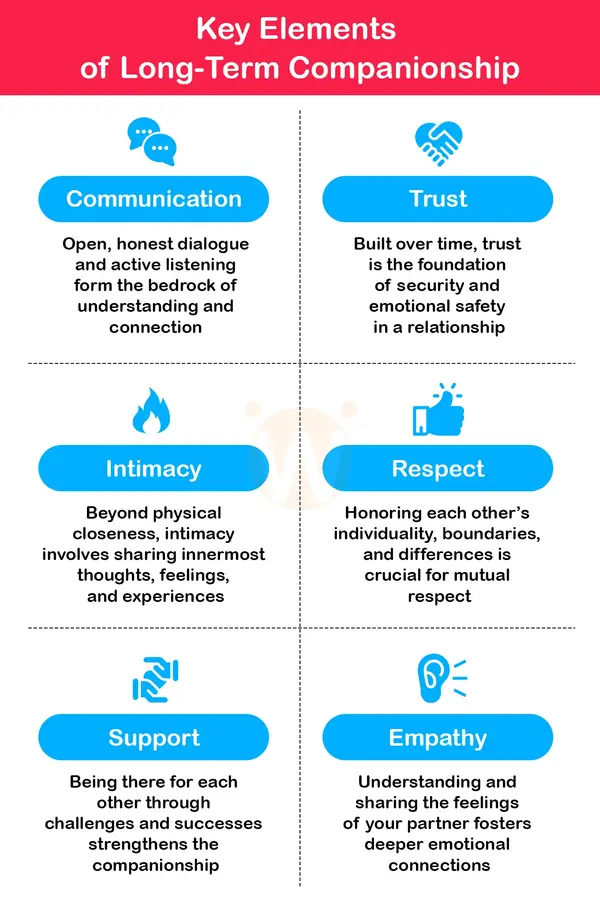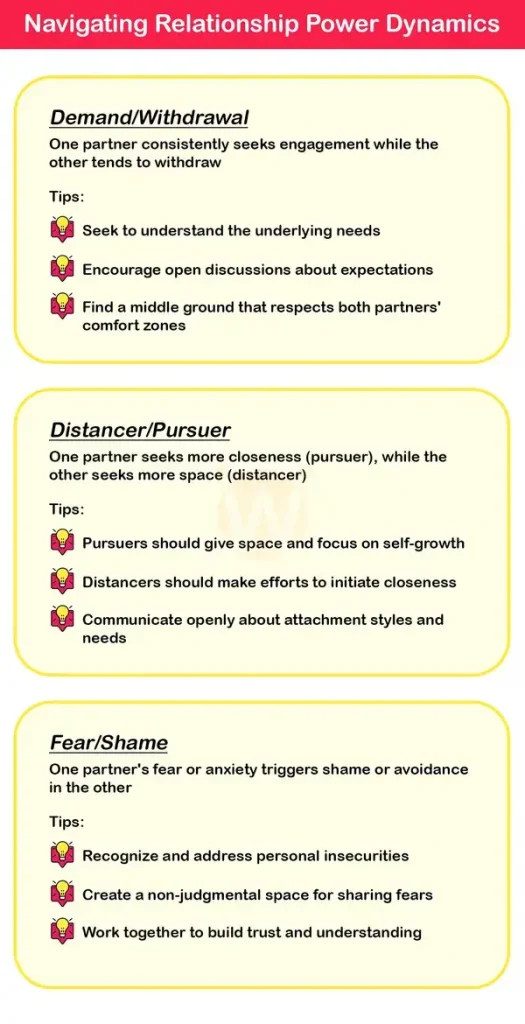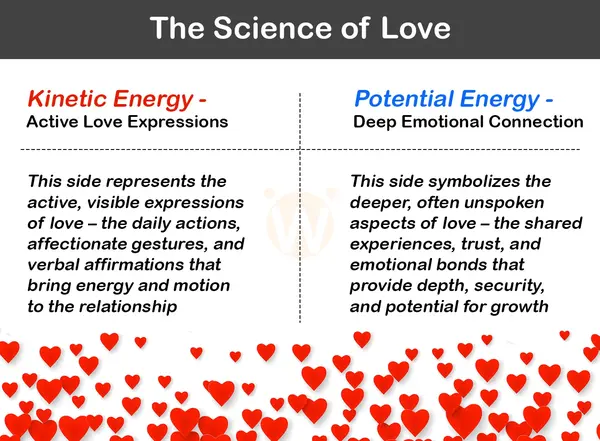Building Strong Bonds: Keys to Successful Companionship
By Prapoorna M
Last Updated: February 27, 2024
In the journey of life, the quest for long-term companionship stands as a testament to our inherent need for connection and understanding. This pursuit, transcending mere romantic notions, encompasses a myriad of relationships that color our existence – from the warmth of lifelong friendships to the depth of enduring love partnerships.
At the core of these connections lies a dynamic interplay of emotions, communication, and shared experiences. Understanding these intricate dynamics is not just about unraveling the complexities of human interactions; it’s about unlocking the secrets to lasting bonds that enrich and sustain us through the ebb and flow of life.
The Essence of Long-Term Companionship

At the heart of our human experience lies the quest for long-term companionship, a journey that extends far beyond fleeting connections. This enduring bond, whether it manifests in the form of a lifelong friendship, a romantic partnership, or a trusted colleague, holds a profound significance in our lives.
Long-term companionship is more than just a continuous presence; it’s a tapestry woven with threads of shared memories, mutual respect, unwavering support, and deep understanding. It transcends the boundaries of time and circumstance, creating a bond that nurtures our souls and supports our personal growth.
The beauty of these connections lies in their diversity. Consider the tender, romantic relationships that evolve with shared life goals and dreams. Then there are the platonic friendships, where companionship is rooted in a profound understanding and unconditional acceptance. Each type of relationship, with its unique dynamics, contributes to our life’s rich mosaic.
Also Read: Are You Still in Love With Each Other? | Never Neglect To Say It
Navigating Relationship Dynamics

In the intricate dance of long-term companionship, certain dynamics play pivotal roles – communication, trust, and boundaries, to name a few. These elements act as the compass guiding relationships through calm and stormy seas alike.
- Communication: The lifeblood of any relationship, effective communication fosters understanding and closeness. It’s about more than just exchanging words; it’s about sharing thoughts, and feelings, and listening with empathy. Breakdowns in communication can lead to misunderstandings and resentment, but when done right, it builds a foundation of trust and mutual respect.
- Trust: This is the cornerstone upon which lasting relationships are built. It’s earned over time through consistent actions and honesty. Trust is fragile; once broken, it’s challenging to rebuild. However, with patience and commitment, it’s possible to restore and even strengthen this vital aspect of your relationship.
- Boundaries: Healthy relationships require clear boundaries. These invisible lines help partners understand each other’s needs, limits, and expectations. Respecting boundaries is about honoring your partner’s individuality and creating a safe space for growth and expression.
Practical Advice:
- Schedule regular check-ins to discuss your feelings and experiences openly.
- Practice active listening – give your full attention and refrain from judgment.
- Celebrate your partner’s achievements and support them in their struggles.
Read our article on Better ways to communicate in relationships
Strategies for Communication and Trust Building
| Stage of Companionship | Common Challenges | Strategies for Overcoming Challenges |
|---|---|---|
| Early Stage | – Navigating initial differences and expectations. – Establishing communication patterns. | – Be open and honest about expectations. – Actively listen and show empathy. – Establish healthy communication habits early on. |
| Mid Stage | – Balancing individuality with togetherness. – Dealing with life stressors like career, family, etc. | – Encourage personal hobbies and interests. – Work as a team to manage external stressors. – Regularly check in on each other’s needs and feelings. |
| Mature Stage | – Keeping the relationship vibrant and engaging. – Adapting to significant life changes (e.g., retirement, empty nest). | – Plan new experiences together. – Discuss and prepare for future life changes together. – Keep nurturing emotional and physical intimacy. |
The Scientific Perspective of Love

Love, in its myriad forms, is a dynamic force that propels relationships forward. From a scientific standpoint, we can liken love to a combination of kinetic and potential energy.
- Kinetic Energy: This represents the active expressions of love – the daily actions, gestures, and words that demonstrate affection and care. Like kinetic energy in motion, these actions bring vitality and momentum to a relationship.
- Potential Energy: This is the stored energy in a relationship, built from shared experiences, trust, and deep emotional connections. It’s the unspoken bond that provides stability and depth, ready to be transformed into kinetic energy through acts of love and intimacy.
Understanding the emotional complexities of love is akin to balancing these two forms of energy. It’s about knowing when to take action and when to rest in the security of your shared bond. This delicate balance is what keeps the relationship healthy and thriving over time.
In long-term companionship, love evolves, influenced by both internal desires and external circumstances. Recognizing and nurturing this ever-changing dynamic is key to a fulfilling and lasting relationship.
Also Read: Effect of love and compassion in our life
Challenges and Growth in Long-Term Companionship
Navigating the waters of long-term companionship is not without its challenges. Common issues like communication breakdowns and maintaining intimacy are often the rocks upon which even the sturdiest of relationships might stumble. But it’s essential to remember that these challenges are also opportunities for growth and deepening bonds.
- Communication Breakdowns: Misunderstandings and unexpressed feelings can create a chasm in any relationship. The key here is to foster an environment where open, honest dialogue is not just encouraged but valued. At Wellness Hub, we advocate for active listening and empathetic responses. It’s about understanding not just the words, but the emotions behind them.
- Maintaining Intimacy: Keeping the flame of intimacy alive requires effort and creativity. This isn’t just about physical closeness but also emotional and intellectual intimacy. Sharing new experiences, setting aside quality time, and expressing appreciation are small steps that can rekindle the spark.
Learn more about Smart Reading Techniques for Students
By confronting these challenges head-on and embracing them as part of your journey together, you and your partner can emerge stronger. Remember, every challenge overcome is a building block for a more robust companionship.
Stages of Long-Term Companionship and Their Challenges
| Stage of Companionship | Common Challenges | Strategies for Overcoming Challenges |
|---|---|---|
| Early Stage | – Navigating initial differences and expectations. – Establishing communication patterns. | – Be open and honest about expectations. – Actively listen and show empathy. – Establish healthy communication habits early on. |
| Mid Stage | – Balancing individuality with togetherness. – Dealing with life stressors like career, family, etc. | – Encourage personal hobbies and interests. – Work as a team to manage external stressors. – Regularly check in on each other’s needs and feelings. |
| Mature Stage | – Keeping the relationship vibrant and engaging. – Adapting to significant life changes (e.g., retirement, empty nest). | – Plan new experiences together. – Discuss and prepare for future life changes together. – Keep nurturing emotional and physical intimacy. |
Maintaining Individuality and Togetherness
In the dance of long-term companionship, maintaining the balance between individuality and togetherness is crucial. It’s about growing together without losing oneself in the process.
Balancing Personal and Relationship Growth: Encourage each other’s personal goals and interests. Celebrate individual achievements as much as joint ones. This mutual support not only strengthens the relationship but also nurtures individual self-esteem and growth.
Tips for Maintaining Individuality:
- Cultivate personal hobbies and interests.
- Spend time with friends and family separately, as well as together.
- Encourage each other to pursue personal goals and dreams.
Also Read: How to Love Your Job though You Don’t Like It?
Evolving with Life Changes
Life, in its beautiful complexity, brings about changes that can be both exhilarating and challenging. In long-term companionship, these changes – be it career transitions, the journey of parenthood, or the shifts that come with aging – are not just individual experiences; they are shared adventures.
- Adapting to Career Changes: Whether it’s a new job, a promotion, or even a setback, career changes affect both partners. The key is to communicate openly about fears, expectations, and hopes. Celebrate each other’s successes and be a pillar of support in times of struggle.
- Embracing Parenthood: For many, becoming parents is a monumental shift. It’s a phase that requires patience, empathy, and a lot of teamwork. Remember to carve out time for your relationship amidst the joys and demands of parenting.
- Aging Together: As time passes, physical and emotional needs evolve. Embracing these changes with grace and humor is vital. It’s about growing old together, cherishing the memories, and looking forward to creating new ones.
In every stage of life, flexibility and understanding are the anchors that keep the relationship steady.
Conclusion
As we draw the curtains on our journey through the ever-evolving landscape of long-term companionship, it’s clear that the tapestry of these relationships is woven with diverse threads – communication, trust, adaptability, and the delicate balance of individuality and togetherness. Each relationship, unique in its essence, navigates through the seas of life’s changes, powered by the sails of mutual understanding and support.
In the end, the true magic of long-term companionship lies in its ability to grow and flourish through the seasons of life, adapting to each new challenge with resilience and grace. Whether it’s navigating power dynamics, embracing life transitions, or simply maintaining the spark that ignited the connection, every step in this journey contributes to a deeper, more meaningful bond.
At Wellness Hub, we understand the complexities and joys that come with long-term relationships. We stand as a beacon of support and guidance, offering insights and tools to help you navigate these waters. Our commitment is to foster wellness not just in the individual but in the bonds that connect us.
As you reflect on your own journey of companionship, consider this: What is the next step you can take to deepen and enrich your relationship? How can you turn today’s challenges into tomorrow’s strengths?
Remember, in the dance of companionship, every step, no matter how small, is a part of the beautiful choreography that makes up a shared life.
Learn more about Ways for Effective and Positive relationships at the Workplace
Frequently Asked Questions:
1. What are the key elements for maintaining long-term companionship?
The key elements for sustaining long-term companionship include effective communication, deep trust, respect for personal boundaries, emotional intimacy, and the ability to adapt to life changes together. Balancing individuality with togetherness is also crucial.
Read about Relationship Counseling on Wellness Hub.
2. How can couples effectively navigate power dynamics in their relationship?
Couples can navigate power dynamics by fostering open communication, practicing empathy, and ensuring both partners feel heard and valued. Addressing issues like demand/withdrawal and distancer/pursuer patterns, and fear/shame dynamics is essential for maintaining a balanced and healthy relationship.
Discover additional strategies in our article on How to Control Test Anxiety in Children, which also addresses the balance of emotional dynamics.
3. Can maintaining individuality strengthen a long-term relationship?
Yes, maintaining individuality can significantly strengthen a long-term relationship. It involves supporting each other’s personal growth, interests, and goals while continuing to grow together as a couple. This balance enhances mutual respect and deepens the connection.
4. What role does flexibility play in long-term companionship?
Flexibility plays a vital role in long-term companionship. It involves adapting to life changes, such as career transitions, parenthood, or aging, and being open to evolving needs and circumstances within the relationship. Flexibility fosters resilience and a deeper understanding between partners.
5. How can scientific perspectives on love enhance our understanding of relationships?
Scientific perspectives, such as viewing love as a balance of kinetic and potential energy, enhance our understanding by providing metaphors that illustrate the dynamic nature of relationships. This approach helps in appreciating the complexities and evolving nature of love in long-term companionship.
6. What are some effective strategies for overcoming communication breakdowns in relationships?
Overcoming communication breakdowns involves active listening, expressing thoughts and feelings openly and respectfully, and avoiding assumptions or judgments. Regular check-ins and empathetic engagement are also effective strategies for enhancing communication in relationships.
For more detailed strategies, check out How to Improve Memory in Studies which also touches on communication techniques for effective learning.
7. Why is trust fundamental in long-term relationships, and how can it be rebuilt if broken?
Trust is fundamental as it forms the foundation of security and emotional safety in a relationship. Rebuilding trust, if broken, requires consistent, honest behavior, open communication, patience, and a commitment to understanding and forgiveness from both partners.
8. How important is emotional intimacy in long-term companionship, and how can it be nurtured?
Emotional intimacy is crucial in long-term companionship as it fosters a deep, meaningful connection between partners. It can be nurtured by regularly sharing thoughts and feelings, showing empathy and understanding, and creating moments for vulnerability and closeness, such as date nights or heartfelt conversations.
9. What impact do external factors like family and societal norms have on long-term relationships?
External factors like family influences and societal norms can significantly impact long-term relationships. They can shape expectations, communication styles, and relationship dynamics. Navigating these factors successfully requires open dialogue, mutual respect, and sometimes setting boundaries to protect the relationship’s integrity.
10. How can couples adapt to the different stages of a long-term relationship?
Couples can adapt to different stages of a long-term relationship by being open to change, maintaining ongoing communication, and continuously nurturing their connection. As each stage may present unique challenges and opportunities, staying attuned to each other’s evolving needs and supporting each other’s personal growth is key.
About the Author:
Prapoorna Mangalampalli
M.Sc., M.A., (Dual Masters in Psychology & English) – Counselor (6+ years of experience)
Prapoorna armed with a passionate dedication fueled by dual Master’s degrees in Psychology and English, Prapoorna sheds light on and elevates human experiences. Over 6+ years of experience fuel her insightful approach to counseling, offering profound empathy and guidance across diverse areas like online, marital, relationship, child, family, and career counseling.
At Wellness Hub, she thrives in a team environment that values innovation, compassion, and achieving results for their clients.
Connect with Prapoorna to learn how she can help you or your loved one find their voice and build a brighter future.
Book your Free Consultation Today
Parent/Caregiver Info:
Client’s Details:
* Error Message







